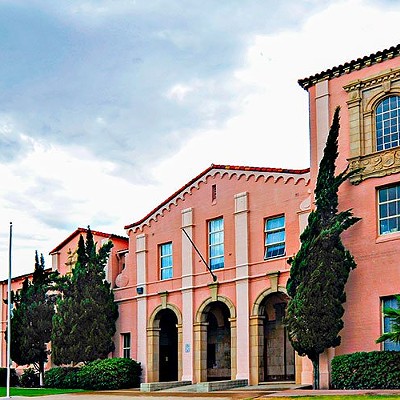TUSD has been short about six pathologists since the beginning of the school year, leaving some 300 children who qualify for services out in the cold. Langrehr's 6-year-old son, a first-grader at Fruchthendler Elementary School, is among them.
"It's just caused more and more educational delays, holding him back to where they were talking about retaining him (in the first grade)," Langrehr said. "Because he's behind in speech, his confidence is really low. He's afraid to speak, to give answers."
Speech and language pathologists work with students to overcome communication problems, either in the production of speech sounds or in language comprehension, more generally. Issues they encounter range from stuttering to vocabulary and grammar deficiencies to other communication disorders.
Estella Zavala, interim director of TUSD's public relations department, said the district would be sending out a letter within the week informing parents about their personnel difficulties. The letter states that TUSD will make up for lost therapy time when pathologists are hired, or compensate parents who find private pathologists to work with their children.
But Langrehr said that's little consolation more than two months into the school year. He said the district has left him in the dark about what his options are, and private pathologists often have long waiting lists.
Langrehr was blunt about TUSD should do: "The school district needs to get their shit together and stop making our kids pay."
Jessica Hoffman's 7-year-old son, Tanner, recently transferred to Fruchthendler Elementary, where he was approved for up to 60 minutes of therapy a week.
But because Fruchthendler is one of eight TUSD schools that doesn't have a pathologist, Hoffman sought services from Tucson Medical Center. She said she put her son on a waiting list of about 200 children a year ago, and he just started receiving therapy.
"He's getting the outside services, but it's inconvenient," Hoffman said. "He has to leave school early."
Hoffman said the lack of pathologists seems like a "non-issue" to TUSD, adding that she just recently learned the district would contract with private pathologists to provide services.
"They've swept it under the carpet," Hoffman said. "They haven't come to us and said, 'Hey, we have a shortage.'"
Zavala said TUSD's energies have been focused on hiring people over the past couple months. Two pathologists from other schools have also been stretching to cover the affected students, she said.
But even if TUSD hasn't kept parents informed, the fact is, school districts all over the country are having a hard time attracting speech and language pathologists. According to officials from three local districts, the main reason is money.
"Within the past five years, the momentum for private agencies has cropped up, offering a very nice package as far as employment packages go," said TUSD pathologist Lori Taniguchi, who has been in the field for 27 years. "It's very attractive."
Richard Faidley, executive director of student services at Amphitheater Public School District, agreed: "If you look into the private sector, the pay is much more significant."
Faidley said Amphi has 21 pathologists working with 862 students. He credited the district's recruitment efforts and relatively generous starting salary of nearly $42,000 with keeping them fully staffed.
Taniguchi said the starting salary in TUSD is $31,000 for those with a bachelor's degree and no experience. Applicants with a master's also get a $2,000 stipend, and experienced pathologists can expect to make slightly more, she said.
Starting salaries in the Flowing Wells Unified School District are between about $31,000 and $37,000, depending on education and certification levels, said Rene Ground, director of student services. A part-time position there has gone unfilled since the beginning of the year, she said.
Private company Student Therapy and Resource Services, in comparison, offers $45,000 a year, plus a signing bonus of $1,000. Officials said this is a typical salary for the private sector.
Public schools must compete for a small group of pathologists coming out of universities with master's degrees, Ground said. Once these limited numbers graduate, they can work in rehabilitation centers, hospitals or even stay in universities--all of which often pay more than public schools.
In Arizona, people with a bachelor's degree can acquire certification and a restricted license to work only in schools as speech and language technicians. Because of the lack of pathologists, these people often do work done by those with master's degrees in other parts of the country, said Betty McDonald, clinical instructor and Pathways Program coordinator at the UA Department of Speech, Language and Hearing Sciences.
"There is a shortage of speech pathologists in the public schools throughout the nation," McDonald said. "Nonetheless, in Tucson, I think the percentage is a little bit greater in terms of need."
To inject more qualified pathologists into the public school system, the Arizona Department of Education has partnered with the UA to offer a part-time master's program for professionals with a bachelor's degree who are already working in schools.
The Pathways Program also allows pathologists to apply some of the time spent working in schools toward getting national certification from the American Speech-Language Hearing Association, which requires 400 hours of supervised fieldwork.
McDonald said some school districts have offered to pick up the tab for the program in exchange for a commitment to stay on after graduation. The first group of at least 10 students will start in 2006, she said.
In the meantime, the dearth of pathologists may be impacting students who need them in the public schools. Langrehr said the lack of therapy has made it difficult for his son to make friends and get work done. It's not that his son doesn't comprehend language or schoolwork, Langrehr said; he just can't articulate himself.
"We're sitting in the car, and he says, 'I can't read,'" Langrehr recalled. "He's learning to read, but he's behind the other students, and the other kids keep telling him. It's really quite sad when he says stuff like that."












